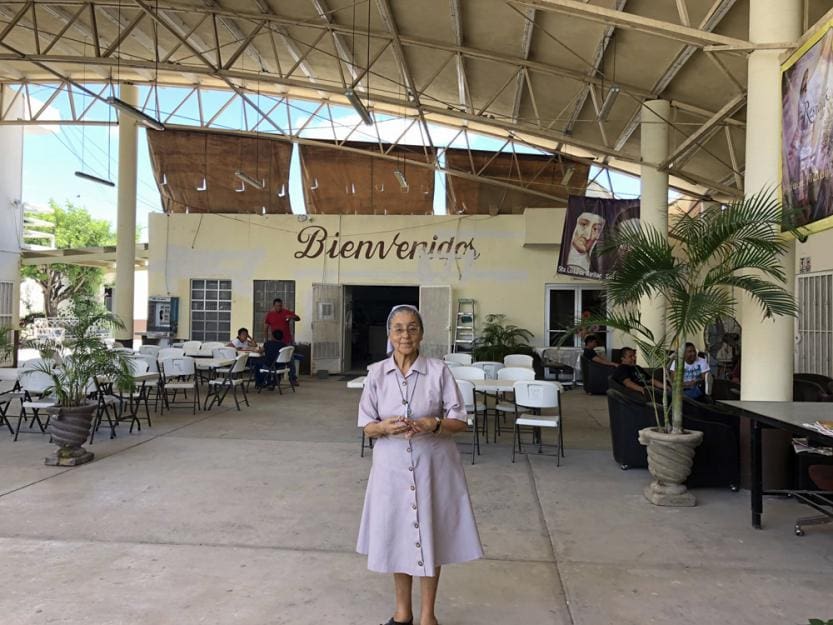![]()
After three days of walking through the desert, an hour from her destination in Houston, Elizabeth Ortiz ran a short distance before U.S. immigration officials tackled her to the ground.
Ortiz had left Mexico City to earn money to send her teenage daughter to college in Mexico, something she knew was not possible on her $40-a-week salary there. She had spent five years undocumented in Seattle, but missed her children too much and chose to return to Mexico. A year later, she decided to try to enter the United States again, this time traveling in a group of 10. Three managed to run away from officials, and one man in his 50s had told the group to leave him behind. The remaining six, including 32-year-old Ortiz, were caught in early May.
As immigration officials pressed her face against the dirt, Ortiz said, she knew her chance had escaped her.
“I couldn’t achieve the American Dream for a second time, and I don’t plan on trying again,” she told Global Sisters Report from a sister-run home in Reynosa, Mexico.
Casa del Migrante Reynosa, run by four Daughters of Charity in a town bordering McAllen, Texas, shelters deportees from the U.S. as they figure out what to do next.

Daughter of Charity Sr. Edith Garrido in the main area of Casa del Migrante Reynosa. (GSR photo / Soli Salgado)
“When they’re deported, they bring with them a very intense pain because they invested in the journey,” said Sr. Edith Garrido, a Daughter of Charity of St. Vincent de Paul who is originally from Hidalgo, Mexico. “Many sold their houses, their animals, or their land to pay for this journey. So they come back with even less. … They come to us unraveled.
“For us, the work is to reintroduce hope in their lives, to tell them, ‘True, you don’t have money, but you’re young, you’re healthy, and you have the will and initiative to get at least this far, to move your life to a new place and confront new realities. … At that age, you have your whole life ahead of you.’
“That’s our job: to awaken them to their new life.”
Taking in 1,100 deportees, monthly
The shelter was originally built 14 years ago for migrants heading to the United States, said Sr. Maria Nidelvia, a Daughter of Charity of St. Vincent de Paul and director of Casa del Migrante. Migrants knocked at church doors throughout Reynosa until a local parish offered their catechesis room where they could sleep.
“But eventually, that room wasn’t enough, so the people [from that parish] helped make this shelter happen,” Nidelvia said.
The diocese laid the first brick in 2004, and in 2005, Casa del Migrante began operating, still with the original parishioners, until they eventually called the Daughters of Charity to take over. The shelter receives financial support from the diocese, Christian churches, donations, and occasionally government support when it is able.
Today, the four sisters — including Nidelvia and Garrido — run the shelter with a handful of volunteers, offering a bed, meals, new clothes, hygiene kits and social services to deportees.
“When they arrive here, they cry like babies,” Garrido said. “It’s a profound frustration: They wanted something better for their families, and instead the earth caved beneath them.”
Casa del Migrante receives around 1,100 deportees a month, said Nidelvia, who’s been the director for seven years. Three flights a week from across the U.S. bring deportees to the border, who then take a bus to the migrant shelter, she said. Not all need to stop at Casa del Migrante if they’ve already made arrangements with their families.
Those who stay in the shelter are typically those who were deported without any money, resources, or the means to communicate with or get to their families. Casa del Migrante also takes in those who seek refuge as they continue migrating north. All stay about three days, though can stay longer depending on health or legal needs, Nidelvia said.
In addition to hygiene kits (toothbrush, soap, towel, clothes, and underwear), the shelter also offers free phone calls, medical and psychological consultations (provided by Doctors Without Borders), personal interviews with the sisters or social workers, group therapy — “whatever they want,” Nidelvia said. “It’s personalized according to the circumstances of their arrivals.”
Some are desperate to get back with their families and work in Reynosa to earn just enough money for a bus ticket home, she said. Those who don’t have family typically end up working longer in Reynosa.
“That’s why Reynosa fills with people,” Nidelvia said. “The city keeps growing to accommodate the people who stay on this side.” They usually end up in maquilas, low-paying factory jobs. Others take temporary jobs, such as cleaning car windows, handing out newspapers or cleaning homes.
Those who don’t have the proper papers or health to work usually wind up “destitute on the streets. But we do have a program for these people,” Nidelvia said, referring to the meals that Casa del Migrante offers to the homeless every morning and evening.
While they only have about 120 beds, the sisters don’t reject anyone, like the time when a caravan with 400 people pulled up from Central America two years ago, she said. The patio fills with mattresses pressed tight against each other, and local parishes step up to donate food and clothes on these occasions.
Nidelvia said she relies on the Holy Spirit to differentiate migrants from those who lie to take advantage of their services. “But if a person is honest about their needs and situation and they say, ‘I’m not a migrant but I’m hungry’ or ‘I’ve been traveling and can’t afford a hotel,’ whatever, if they’re honest, we say, ‘Come on in.’ ”
To continue reading and view more photos, click here.
Source: Global Sisters Report, written by Soli Salgado







0 Comments